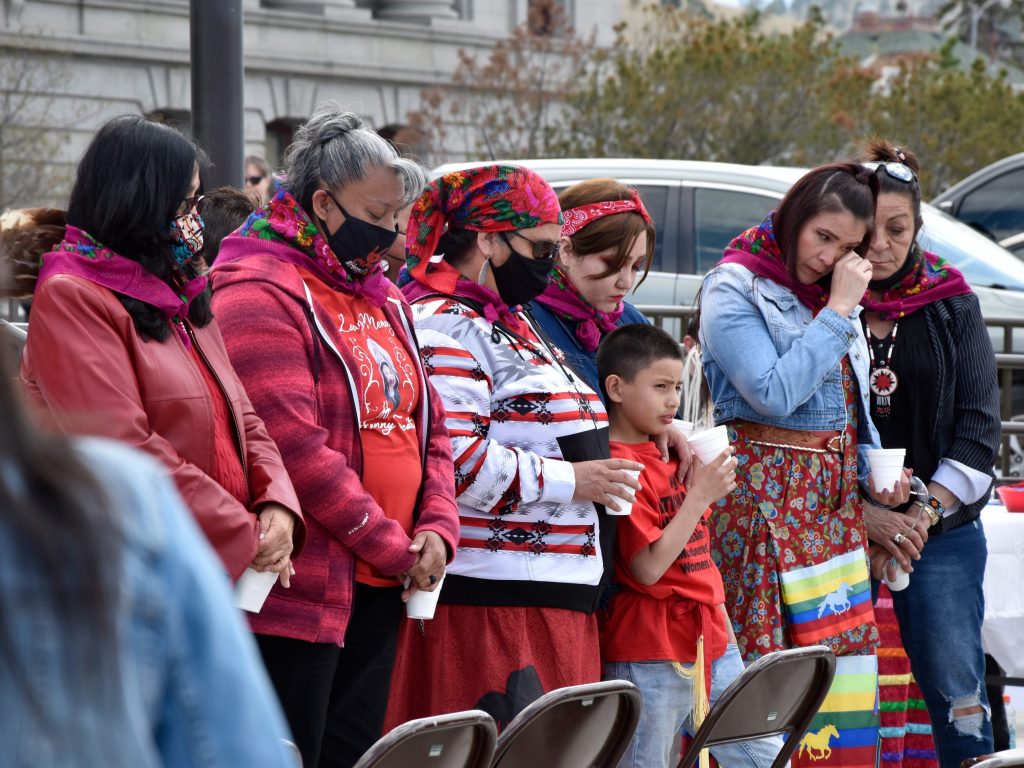- Abortion rights may be overturned, according to a leaked Supreme Court opinion published Monday.
- Access to abortion is "essential" for Indigenous victims of domestic violence and sex trafficking, one expert said.
- "Many of our tribal members are dependent on the state's access to abortion," Abigail Echo-Hawk said.
As the Supreme Court appears set to toss Roe v. Wade, some are concerned with the impact the decision could have on the crisis of missing and murdered Indigenous people.
"Access to safe and legal abortion is absolutely essential as we look at American Indian and Alaska Native women having some of the highest rates of sexual violence or possibilities of going missing and being murdered," Abigail Echo-Hawk, the director of the Urban Indian Health Institute, told Insider.
Echo-Hawk, a citizen of the Pawnee Nation of Oklahoma, is an expert on American Indian and Alaska Native health, as well as the missing and murdered Indigenous women and girls (MMIWG) crisis.
Indigenous people in the US go missing, are murdered, and are sexually and physically assaulted at higher rates than other groups. According to data published by the National Institute of Justice, more than four out of five Native women have experienced violence and more than half have experienced sexual violence.
Women living on reservations are murdered at a rate ten times the national average, according to the CDC. Echo-Hawk said many are victims of domestic violence, sexual assault, and sex trafficking.
In the case of domestic violence, she said reproductive coercion is common, adding that abusers often deny victims access to birth control. For victims of sex trafficking, Echo-Hawk said most are under total control of the perpetrators.
Traffickers might not allow their kidnapped victims to use birth control. They might control and limit their movements, including whether or not they can go outside or use the bathroom. And they might force them to have nonconsensual sex with a certain number of people per day.
"One individual told me the trafficker would not allow her to have the men use condoms because they could make more money that way," Echo-Hawk said, adding that for these victims overturning Roe v. Wade could have dire consequences.
But according to a leaked draft opinion published on Monday, the federally protected right to an abortion is likely to be overturned, a move that would allow states to enforce their own abortion restrictions and further strain Native people's access.
Many Native people rely on state-level access to abortions
"The looming Supreme Court decision to overturn Roe v. Wade sets up some big potential conflicts between states and the federal government and between states and Indian tribes," Neama Rahmani, the president of West Coast Trial Lawyers and a former federal prosecutor, told Insider.
Rahmani said Native tribes would still have the sovereign right to open abortion clinics on tribal lands located in states that have bans.
However, many medical facilities on reservation lands receive funding from or are run by the Indian Health Service (IHS), a division of the US Department of Health and Human Services subject to the Hyde Amendment.
A legislative provision that took effect in 1980, the amendment blocks the use of federal funds to pay for abortion, with exceptions in cases of rape, incest, and to save the life of the mother.
The result is that abortions are often not accessible at clinics located on reservations, according to Echo-Hawk. She said even though there is an exception for rape, there are bureaucratic steps that make it challenging.
For instance, the IHS requires the rape to be reported to police within 60 days of the assault in order for someone to receive abortion care. But according to the Justice Department, more than 80% of sexual assaults and rapes go unreported.
Some IHS facilities aren't equipped to provide abortion services at all. A 2002 study found 85% of IHS facilities did not have any abortion services available and that 62% said they could not provide abortions even in the case of a threat to the mother's life.
"Many of our tribal members are dependent on the state's access to abortion," Echo-Hawk said, adding that for missing and murdered Indigenous people, whose cases are solved at lower rates than their white counterparts, that access is necessary.
"At the very terrible least, they should have access to safe and legal abortion," she said.

